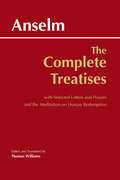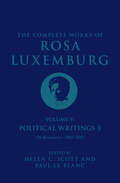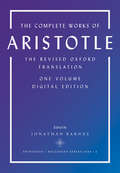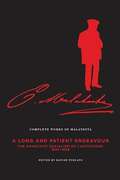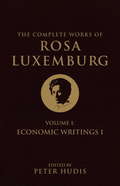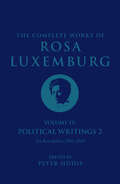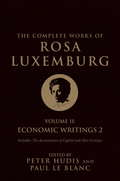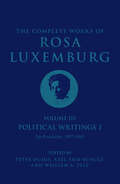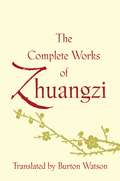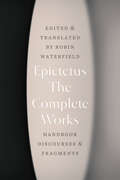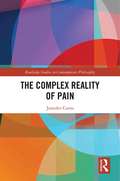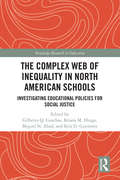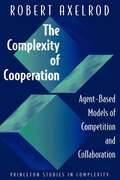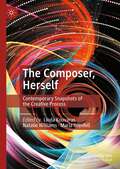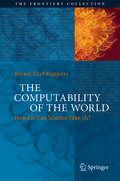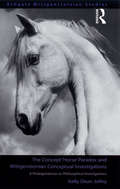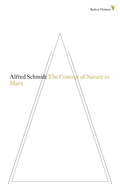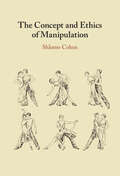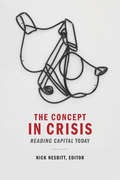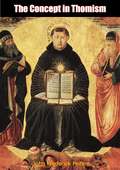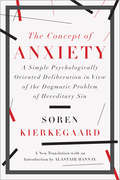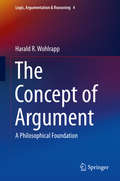- Table View
- List View
The Complete Treatises: with Selected Letters and Prayers and the Meditation on Human Redemption (Hackett Classics)
by AnselmAn expanded version of the translator&’s Anselm: The Basic Writings, The Complete Treatises incorporates new translations of works omitted from that volume (most notably, De grammatico) in addition to selected letters and prayers of philosophical interest. The only such collection translated by a single hand and rendered with attention to terminological consistency across the treatises, it&’s the ideal choice for use by students of philosophy and theology.
The Complete Works Volume of Rosa Luxemburg: Volume V
by Rosa LuxemburgThis volume is the first to contain all of Luxemburg&’s eloquent writings on the 1917 Russian Revolution and 1918-19 German RevolutionThis volume is the first to contain all of Luxemburg&’s eloquent writings on the 1917 Russian and 1918-19 German Revolutions. It also contains articles, essays and manuscripts on the European socialist movement prior to World War I and her effort to rebuild the socialist movement on revolutionary foundations in its aftermath.Much of this material appears in English for the first time. Her incisive contributions on revolutionary strategy, the German and Russian Revolutions, and the transition to socialism reveal a profound commitment to radical democracy, which becomes evident as she elaborates on her lived experience with razor-sharp conceptualizations of the mass strike.Her democratic commitment is also highlighted in her deepening conflict with the bureaucratic conservatism afflicting the German Social Democratic Party.She is horrified yet at the same time grimly analytical while surveying the unfolding violence and brutality of the First World War.Deeply inspired by Russia&’s 1917 upsurge, she is nonetheless compelled to analyze and criticize fatal limitations of the Russian Revolution.Swept up in the revolutionary chaos sweeping through Germany in 1918-1919 which results in her own martyrdom, she gives voice to revolution&’s final testament: &“I was, I am, I shall be.&”
The Complete Works of Aristotle
by Aristotle Jonathan BarnesThis digital edition combines, for the first time, both volumes of The Complete Works of Aristotle: The Revised Oxford Translation, which is universally recognized as the standard English version.The Oxford Translation of Aristotle was originally published in twelve volumes between 1912 and 1954. The revised edition contains the substance of the original translation, slightly emended in light of recent scholarship; three of the original versions have been replaced by new translations; and a new and enlarged selection of fragments has been added. The aim of the translation remains the same: to make the surviving works of Aristotle readily accessible to English-speaking readers.
The Complete Works of Malatesta V.III: The Anarchist Socialism of L'Agitazione, 189798
by Paul Sharkey Errico Malatesta Davide TurcatoThe first in AK Press's ten-volume Complete Works of Malatesta. This one (volume three chronologically) focuses on two very important years in Errico Malatesta's life, when he returned to Italy to edit L'Agitazione. This volume begins the series with a bang.
The Complete Works of Rosa Luxemburg
by Rosa Luxemburg Peter HudisThis first volume of Rosa Luxemburg's Complete Works, entitled Economic Writings I, will contain some of Luxemburg's most important writings on the globalization of capital, wage labor, imperialism and pre-capitalist economic formations, most of which have never before appeared in English. In addition to including a new translation of her doctoral dissertation, The Industrial Development of Poland, it will include the first complete English translation of her Introduction to Political Economy, which explores (among other issues) the impact of capitalist commodity production and industrialization upon non-capitalist social strata in the developing world.The volume will also include ten recently discovered manuscripts, all of which will appear in English for the first time.
The Complete Works of Rosa Luxemburg Volume IV: Political Writings 2, On Revolution (1906-1909)
by Rosa LuxemburgPart Four of a comprehensive collection of Rosa Luxemburg's writingThis 600-page volume of Luxemburg's Complete Works contains her writings "On Revolution" from 1906 to 1909--covering the 1905-06 Russian Revolution, one of the most important revolutions of modern times, and its aftermath. The volume contains numerous writings never before in available in English, such her pathbreaking essay, "Lessons of the Three Dumas," which presents a unique perspective on the transition socialism, her "Notes on the English Revolution" of the 1640's, and numerous writings on of the role of the mass strike in fomenting revolutionary transformation. All of the material in the volume consists of new translations, from German, Polish, and Russian originals.
The Complete Works of Rosa Luxemburg, Volume II
by Rosa Luxemburg Peter Hudis Paul Le BlancRosa Luxemburg (1871-1919) is widely regarded as one of the most creative writers of modern socialism and the foremost female theoretician of European radicalism. Her wide-ranging and incisive works, which include studies on capitalism's inherent drive for global expansion, the relation between spontaneity and organization, and the inseparability of democracy and socialism, have made her a pole of attraction for theorists and activists around the world. Her fiercely independent intellect and uncompromising defense of human liberty speaks more powerfully to our era than to any other.This volume contains a new English translation of Luxemburg's most important book, The Accumulation of Capital (1913) as well as her response to its critics. Taken together, they constitute one of the most important Marxist studies of the globalization of capital.
The Complete Works of Rosa Luxemburg, Volume III: Political Writings 1: On Revolution-1897-1905
by Rosa Luxemburg Peter HudisRosa Luxemburg's theoretical masterpieceThis collection is the first of three volumes of the Complete Works devoted to the central theme of Rosa Luxemburg’s life and work—revolution. Spanning the years 1897 to the end of 1905, they contain speeches, articles, and essays on the strikes, protests, and political debates that culminated in the 1905 Russian Revolution—one of the most important social upheavals of modern times. Luxemburg’s near-daily articles and reports during 1905 on the ongoing revolution (which comprises the bulk of this volume) shed new light on such issues as the relation of spontaneity and organization, the role of national minorities in social revolution, and the inseparability ofthe struggle for socialism from revolutionary democracy. We become witness to Luxemburg’s effort to respond to the impulses, challenges, and ideas arising from a living revolutionary process, which in turn becomes the source of much of her subsequent political theory—such as her writings on the mass strike, her strident internationalism, and her insistence that revolutionary struggle never take its eyes off of the need to transform the human personality.Virtually all of these writings appear in English for the first time (translated from both German and Polish) and many have only recently been identified as having been written by Luxemburg.
The Complete Works of Zhuangzi
by Burton WatsonOnly by inhabiting Dao (the Way of Nature) and dwelling in its unity can humankind achieve true happiness and freedom, in both life and death. This is Daoist philosophy's central tenet, espoused by the person -- or group of people -- known as Zhuangzi (369?-286? B.C.E.) in a text by the same name. To be free, individuals must discard rigid distinctions between good and bad, right and wrong, and follow a course of action not motivated by gain or striving. When one ceases to judge events as good or bad, man-made suffering disappears and natural suffering is embraced as part of life.Zhuangzi elucidates this mystical philosophy through humor, parable, and anecdote, deploying non sequitur and even nonsense to illuminate a truth beyond the boundaries of ordinary logic. Boldly imaginative and inventively worded, the Zhuangzi floats free of its historical period and society, addressing the spiritual nourishment of all people across time. One of the most justly celebrated texts of the Chinese tradition, the Zhuangzi is read by thousands of English-language scholars each year, yet only in the Wade-Giles romanization. Burton Watson's pinyin romanization brings the text in line with how Chinese scholars, and an increasing number of other scholars, read it.
The Complete Works of Zhuangzi (Translations from the Asian Classics)
by Burton WatsonOnly by inhabiting Dao (the Way of Nature) and dwelling in its unity can humankind achieve true happiness and freedom, in both life and death. This is Daoist philosophy's central tenet, espoused by the person—or group of people—known as Zhuangzi (369?-286? B.C.E.) in a text by the same name. To be free, individuals must discard rigid distinctions between good and bad, right and wrong, and follow a course of action not motivated by gain or striving. When one ceases to judge events as good or bad, man-made suffering disappears and natural suffering is embraced as part of life.Zhuangzi elucidates this mystical philosophy through humor, parable, and anecdote, deploying non sequitur and even nonsense to illuminate a truth beyond the boundaries of ordinary logic. Boldly imaginative and inventively worded, the Zhuangzi floats free of its historical period and society, addressing the spiritual nourishment of all people across time. One of the most justly celebrated texts of the Chinese tradition, the Zhuangzi is read by thousands of English-language scholars each year, yet only in the Wade-Giles romanization. Burton Watson's pinyin romanization brings the text in line with how Chinese scholars, and an increasing number of other scholars, read it.
The Complete Works: Handbook, Discourses, & Fragments
by EpictetusThe complete surviving works of Epictetus, the most influential Stoic philosopher from antiquity. “Some things are up to us and some are not.” Epictetus was born into slavery around the year 50 CE, and, upon being granted his freedom, he set himself up as a philosophy teacher. After being expelled from Rome, he spent the rest of his life living and teaching in Greece. He is now considered the most important exponent of Stoicism, and his surviving work comprises a series of impassioned discourses, delivered live and recorded by his student Arrian, and the Handbook, Arrian’s own take on the heart of Epictetus’s teaching. In Discourses, Epictetus argues that happiness depends on knowing what is in our power to affect and what is not. Our internal states and our responses to events are up to us, but the events themselves are assigned to us by the benevolent deity, and we should treat them—along with our bodies, possessions, and families—as matters of indifference, simply making the best use of them we can. Together, the Discourses and Handbook constitute a practical guide to moral self-improvement, as Epictetus explains the work and exercises aspirants need to do to enrich and deepen their lives. Edited and translated by renowned scholar Robin Waterfield, this book collects the complete works of Epictetus, bringing to modern readers his insights on how to cope with death, exile, the people around us, the whims of the emperor, fear, illness, and much more.CUSTOMER NOTE: THE HARDCOVER IS FOR LIBRARIES AND HAS NO JACKET.
The Complex Reality of Pain (Routledge Studies in Contemporary Philosophy)
by Jennifer CornsThis book employs contemporary philosophy, scientific research, and clinical reports to argue that pain, though real, is not an appropriate object of scientific generalisations or an appropriate target for medical intervention. Each pain experience is instead complex and idiosyncratic in a way which undermines scientific utility. In addition to contributing novel arguments and developing a novel position on the nature of pain, the book provides an interdisciplinary overview of dominant models of pain. The author lays the needed groundwork for improved models and targeted treatments at a time when pain science, pain medicine, and philosophy are explicitly searching for both and failing to find them. The Complex Reality of Pain will be of interest to a broad range of researchers and students, including those working in philosophy of mind, philosophy of science, cognitive science, neuroscience, medicine, health, cognitive and behavioural psychology, and pain science.
The Complex Web of Inequality in North American Schools: Investigating Educational Policies for Social Justice (Routledge Research in Education)
by Gilberto Q. Conchas Briana M. Hinga Miguel N. Abad Kris D. GutiérrezThe Complex Web of Inequality in North American Schools analyzes and challenges the critical gaps and inequalities that persist in the American school system. Showing how historical biases have been inherited in current polices relating to non-dominant youth, the text calls for educational reforms that perform in the name of social justice. This edited collection carefully interrogates how technocratic educational policies and reforms are often unequipped to address the interplay of political, social, economic, ideological factors that are at the roots of educational injustice. Considering the most vulnerable student populations, original case studies explore how inadequate structures, practices, and beliefs have increased marginalization, and highlight those instances in which policy has proved effective in reducing opportunity gaps between economically rich and poor students; between white, Asian, Black and Latino youth; between native English speakers and second language learners; highlighting racial integration and unequal American Indian education; and for students with special educational needs. The insights into such policies shed light on the complex web of historically embedded inequities that continue to shape the construction, roll-out, and consequences of education policy for the most marginalized youth populations today. This volume will be of interest to graduate, and postgraduate students, researchers and academics in the fields of education policy, sociology of education, economics of education, and history of education, and well as policy evaluation.
The Complexity of Cooperation: Agent-Based Models of Competition and Collaboration (Princeton Studies in Complexity #3)
by Robert AxelrodRobert Axelrod is widely known for his groundbreaking work in game theory and complexity theory. He is a leader in applying computer modeling to social science problems. His book The Evolution of Cooperation has been hailed as a seminal contribution and has been translated into eight languages since its initial publication. The Complexity of Cooperation is a sequel to that landmark book. It collects seven essays, originally published in a broad range of journals, and adds an extensive new introduction to the collection, along with new prefaces to each essay and a useful new appendix of additional resources. Written in Axelrod's acclaimed, accessible style, this collection serves as an introductory text on complexity theory and computer modeling in the social sciences and as an overview of the current state of the art in the field. The articles move beyond the basic paradigm of the Prisoner's Dilemma to study a rich set of issues, including how to cope with errors in perception or implementation, how norms emerge, and how new political actors and regions of shared culture can develop. They use the shared methodology of agent-based modeling, a powerful technique that specifies the rules of interaction between individuals and uses computer simulation to discover emergent properties of the social system. The Complexity of Cooperation is essential reading for all social scientists who are interested in issues of cooperation and complexity.
The Complexity of Self Government
by Ruth LaneThe Complexity of Self Government represents a revolutionary approach to political science. Bottom-up theory turns political and social analysis upside down by focusing analytic attention not on vacuous abstractions but on the individual men and women who either consciously or inadvertently create the institutions within which they live. Understanding this practical level of human activity is made possible through complexity theory, recently developed in computer models, but of wider use in understanding everyday human behaviour. To this complexity framework, the book adds social science to give life and colour to the analytical picture: micro-sociology from Garfinkel and Goffman, anthropology from Bourdieu, and non-technical game theory based on Thomas Schelling's microanalytics, to give rigour and bite. Theoretical examples include India's Mumbai, Iran, the marshes of southern Iraq, Berlusconi's Italy, backcountry China, Zimbabwe, and Nelson Mandela's revolution in South Africa.
The Composer, Herself: Contemporary Snapshots of the Creative Process
by Natalie Williams Linda Kouvaras Maria GrenfellThis edited volume presents 27 original essays by living composers from all around the globe, reflecting on the creation of their music. Coterminous to the recent worldwide resurgence in feminist focus, the distinctive feature of this collection is the “snapshots” of creative processes and conceptualizing on the part of women who write music, writing in the present day, from prominent early-career composers to major figures, from a range of ethnic backgrounds in the contemporary music field. The chapters step into the juncture point at which feminism finds itself: as binary conceptions of gender are being dissolved, with critiques of the attendant gender-based historical generalizations of composers, and with the growing awareness of the rightful place of First Nations' cultural voices, the contributors explore what, actually, is being composed by women, and what they think about their world. The needs that this book serves are acutely felt: despite recent social gains, and sector initiatives and programs encouraging and presenting the work of women who compose music, their works are yet to receive commensurate exposure with that of their male counterparts. In its multi-pronged, direct response to this dire situation, this vibrant volume highlights established as well as emerging women composers on the international stage; reveals myriad issues around feminism, as broadly conceived; and gives insights, from the composers' own voices, on the inner workings of their composition process.The volume thus presents a contemporary moment in time across the generations and within developments in musical composition. With its unique insights, this book is essential for academics and practitioners interested in the illuminations of the current working landscape for creative women.
The Computability of the World: How Far Can Science Take Us? (The Frontiers Collection)
by Bernd-Olaf Küppers Paul WoolleyIn this thought-provoking book Küppers, an internationally renowned physicist, philosopher and theoretical biologist, addresses a number of science's deepest questions: Can physics advance to the origin of all things and explain the unique phenomena of life, time and history? Are there unsolvable enigmas of the world? How did life originate? Is language a general phenomenon of Nature? What is time? Is it possible to express the history of the world in formulae? Where is science leading us? These and other provocative questions essential for a deeper understanding of the world are treated here in a refreshing and stimulating manner.
The Conative Connection: Uncovering the Link Between Who You Are and How You Perform
by Kathy KolbeKolbe identifies four modes of action, which each individual has in varying amounts. You use each mode at least some of the time, but you probably use one or more primarily and avoid another. Are you predominantly a Fact Finder, careful to research a problem before responding? Or are you a Follow Thru, for whom systems are the answer? Perhaps you're a Quick Start, spontaneous and innovative in your solutions. Or an Implementor, relishing demonstration and tangible results. You don't have to change the way you are to improve your performance. Kolbe shows you how to predict what you and other people will and won't do.
The Concept 'Horse' Paradox and Wittgensteinian Conceptual Investigations: A Prolegomenon to Philosophical Investigations (Ashgate Wittgensteinian Studies)
by Kelly Dean JolleyIn The Foundations of Arithmetic, Gottlob Frege contended that the difference between concepts and objects was absolute. He meant that no object could be a concept and no concept an object. Benno Kerry disagreed; he contended that a concept could be an object, and that therefore the difference between concepts and objects was only relative. In this book, Jolley aims to understand the debate between Frege and Kerry. But Jolley's purpose is not so much to champion either side; rather, it is to utilize an understanding of the debate to shed light on the work of Ludwig Wittgenstein-and vice versa. Jolley not only sifts through the debate between Frege and Kerry, but also through subsequent versions of the debate in J. J. Valberg and Wilfred Sellars. Jolley's goal is to show that the central notion of Philosophical Investigations, that of a 'conceptual investigation', is a legacy of the Frege/Kerry debate and also a contribution to it. Jolley concludes that the difference between concepts and objects is as absolute in its way in Philosophical Investigations as it was in The Foundations of Arithmetic and that recognizing the absoluteness of the difference in Philosophical Investigations provides a beginning for a 'resolute' reading of Wittgenstein's book.
The Concept Of Nature In Marx
by Alfred SchmidtIn The Concept of Nature in Marx, Alfred Schmidt examines humanity's relation to the natural world as understood by the great philosopher-economist Karl Marx, who wrote that human beings are 'part of Nature yet able to stand over against it; and this partial separation from Nature is itself part of their nature'. In Marx, industry and science are the mediation between historical man and external nature, leading either to reconciliation or mutual annihilation. Schmidt explores this tension between man and nature in Marx and shows how his understanding of nature is reflected in the work of writers such as Bertolt Brecht, Walter Benjamin and Ernst Bloch.
The Concept and Ethics of Manipulation
by Shlomo CohenEveryone is exposed to manipulation daily, and everyone manipulates too. The impact of manipulations in personal, social, and political life is enormous. Is this tragic? Is it avoidable? Is it always morally bad or regrettable? To answer these questions, we need a theory of manipulation. This book is the first comprehensive philosophical theory of manipulation. Shlomo Cohen offers a new theory on what manipulation is, distinguishing it from other kinds of influence, and assesses the basic moral status of manipulation. In contrast to prevailing views, he argues that manipulation, though often morally bad, is not inherently morally bad, and that alongside its dangers, it has a central role as a 'lubricant' of social frictions which helps to regulate social and political relations. His analysis offers a window to better understanding the ethics of the interplay of reason and power in human relations.
The Concept in Crisis: Reading Capital Today
by Nick NesbittThe publication of Reading Capital—by Louis Althusser, Étienne Balibar, Roger Establet, Pierre Macherey, and Jacques Rancière—in 1965 marked a key intervention in Marxist philosophy and critical theory, bringing forth a stunning array of concepts that continue to inspire philosophical reflection of the highest magnitude. The Concept in Crisis reconsiders the volume’s reading of Marx and renews its call for a critique of capitalism and culture for the twenty-first century. The contributors—who include Alain Badiou, Étienne Balibar, and Fernanda Navarro—interrogate Althusser's contributions in particular within the context of what is surely the most famous collective reading of Marx ever undertaken. Among other topics, they offer a symptomatic critique of Althusser; consider his writing as a materialist production of knowledge; analyze the volume’s conceptualization of value and crisis; examine how leftist Latin American leaders like Che Guevara and Subcomandante Marcos engaged with Althusser and Reading Capital; and draw out the volume's implications and use for feminist theory and praxis. Retrieving the inspiration that drove Althusser's reinterpretation of Marx, The Concept in Crisis explains why Reading Capital's revolutionary inflection retains its critical appeal, prompting readers to reconsider Marx's relevance in an era of neoliberal capitalism. Contributors. Emily Apter, Alain Badiou, Étienne Balibar, Bruno Bosteels, Adrian Johnston, Warren Montag, Fernanda Navarro, Nick Nesbitt, Knox Peden, Nina Power, Robert J. C. Young
The Concept in Thomism
by John Frederick PeiferOf all the problems, or rather mysteries, with which philosophy deals, those concerned with the nature and objectivity of human knowledge hold a privileged position.In The Concept in Thomism this problem, stemming from Descartes, is clearly and forcefully stated. Thus, from the very beginning, the reader is made aware of the central difficulty faced by any theory of knowledge.The Cartesian and Kantian phases in the development of a satisfactory theory are briefly but adequately described. Then, John Peifer sets forth the reconciliation of both the immanence and transcendence of knowledge as explained by the realistic traditions originating with Aristotle and Thomas Aquinas.The differences between mere physical and psychic changes and the conditions required for knowing are explained in detail. The often misunderstood doctrine of the species, its nature and necessity, is wonderfully developed and shown to be a cognitional necessity.The most important part of this work, however, is concerned with the role of the concept in knowledge. The correct notion of the objective concept, so long neglected, is shown to be the key for a realistic philosophical doctrine. This study alone makes The Concept in Thomism a work of exceeding importance for future philosophers and thinkers.
The Concept of Anxiety: A Simple Psychologically Oriented Deliberation in View of the Dogmatic Problem of Hereditary Sin
by Alastair Hannay Soren KierkegaardThe first new translation of Kierkegaard's masterwork in a generation brings to vivid life this essential work of modern philosophy. Brilliantly synthesizing human insights with Christian dogma, Soren Kierkegaard presented, in 1844, The Concept of Anxiety as a landmark "psychological deliberation," suggesting that our only hope in overcoming anxiety was not through "powder and pills" but by embracing it with open arms. While Kierkegaard's Danish prose is surprisingly rich, previous translations--the most recent in 1980--have marginalized the work with alternately florid or slavishly wooden language. With a vibrancy never seen before in English, Alastair Hannay, the world's foremost Kierkegaard scholar, has finally re-created its natural rhythm, eager that this overlooked classic will be revivified as the seminal work of existentialism and moral psychology that it is. From The Concept of Anxiety: "And no Grand Inquisitor has such frightful torments in readiness as has anxiety, and no secret agent knows as cunningly how to attack the suspect in his weakest moment, or to make so seductive the trap in which he will be snared; and no discerning judge understands how to examine, yes, exanimate the accused as does anxiety, which never lets him go, not in diversion, not in noise, not at work, not by day, not by night."
The Concept of Argument
by Harald R. WohlrappArguing that our attachment to Aristotelian modes of discourse makes a revision of their conceptual foundations long overdue, the author proposes the consideration of unacknowledged factors that play a central role in argument itself. These are in particular the subjective imprint and the dynamics of argumentation. Their inclusion in a four-dimensional framework (subjective-objective, structural-procedural) and the focus on thesis validity allow for a more realistic view of our discourse practice. Exhaustive analyses of fascinating historical and contemporary arguments are provided. These range from Columbus's advocacy of the Western Passage to India, over the trial of King Louis XVI during the French Revolution, to today's highly charged controversies surrounding euthanasia and embryo research. Excavating foundational issues such as the purpose of argument itself (assent of an audience or critical examination of validity claims) and the contested role of argument as a generator of knowledge, the book culminates in a discussion of the relationship between rationality and reasonableness and criticizes the restrictions of 'rational' argument relying on fixed logical, economic or cultural criteria that in reality are mutable. Here, a true, open argument requires the infusion of Paul Lorenzen's principle of 'transsubjectivity', which recognizes but transcends the partiality of the individual and which can be seen in the pragmatic and expanding consensus that humanity can control itself to safeguard the future of a fragile, damaged world.
